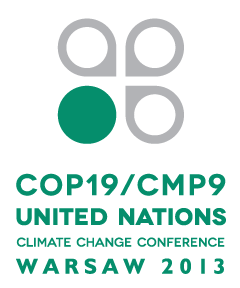Over three days, 40 ministers and their representatives, UNFCCC Secretariat officials, the Co-chairs of Ad Hoc Working Group on the Durban Platform for Enhanced Action (ADP), the Subsidiary Body for Implementation (SBI) and the Subsidiary Body for Scientific and Technological Advice (SBSTA) and, for the first time, representatives of the business sector, gathered in Warsaw to present their views and discuss a number of issues ahead of the 19th session of the Conference of the Parties (COP 19) to the UNFCCC.
 10 October 2013: Over three days, 40 ministers and their representatives, UNFCCC Secretariat officials, the Co-chairs of Ad Hoc Working Group on the Durban Platform for Enhanced Action (ADP), the Subsidiary Body for Implementation (SBI) and the Subsidiary Body for Scientific and Technological Advice (SBSTA) and, for the first time, representatives of the business sector, gathered in Warsaw to present their views and discuss a number of issues ahead of the 19th session of the Conference of the Parties (COP 19) to the UNFCCC.
10 October 2013: Over three days, 40 ministers and their representatives, UNFCCC Secretariat officials, the Co-chairs of Ad Hoc Working Group on the Durban Platform for Enhanced Action (ADP), the Subsidiary Body for Implementation (SBI) and the Subsidiary Body for Scientific and Technological Advice (SBSTA) and, for the first time, representatives of the business sector, gathered in Warsaw to present their views and discuss a number of issues ahead of the 19th session of the Conference of the Parties (COP 19) to the UNFCCC.
According to the Incoming President’s conclusions, the Pre-COP meeting, which took place from 2-4 October 2013, in Warsaw, Poland, focused on business involvement and climate finance, the 2015 agreement, ambition of action, and loss and damage.
During the ministerial-business exchange of views, business sector representatives emphasized the need for a simple and stable regulatory framework that would limit investment risk and provide clarity and a long-term perspective for investments and initiatives. Many called for the new agreement to address the risk of carbon leakage in the context of global competitiveness between business entities.
On finance, discussions focused on swift capitalization and operationalization of the Green Climate Fund (GCF) and on how public finance can leverage private investments. Some participants highlighted the need to discuss the effectiveness of climate finance, others called for more to be done on adaptation financing, including better involvement of business community in this respect.
On the 2015 agreement, ministers agreed that the 2015 package should consist of a simple core text, accompanied by further implementing decisions. They noted that mitigation, adaptation and means of implementation must be addressed in a balanced manner, and that the agreement’s success depends on the level of participation. Ministers emphasized the need for a decision in Warsaw on a timeline for negotiations to COP 21 in 2015, including additional meetings. They noted that the draft text must be distributed to all parties by the end of May 2015 at the latest. According to the Incoming President’s conclusions, clarification is still needed on: the incorporation of mitigation commitments into the 2015 package; the nature of the consultation phase; how to capture differentiation of the commitments; and how the “legally binding” concept will work in practice.
On ambition of action, ministers broadly agreed that there should be ambition not only in relation to mitigation, but also to adaptation and means of implementation. Some called for taking into account the role of the land use and the forestry sector in the discussions on ambition of action.
Ministers urged progress in Warsaw on loss and damage. Views converged on: recognition of a link among mitigation, adaptation and loss and damage; the need for advancing collective understanding of the effective approaches towards loss and damage; and risk management, enhanced cooperation and coordination, access, sharing and use of existing data.
The incoming COP 19 President confirmed his intentions to take up, among others, the issue of climate finance and of the new agreement at the High Level Segment in Warsaw. [COP 19 Press Release] [COP 19 Website]